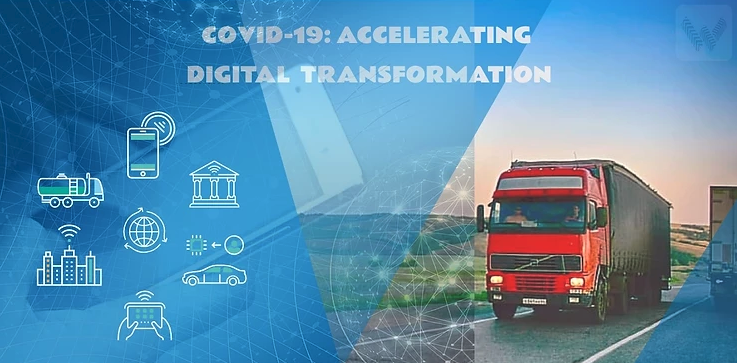The COVID-19 outbreak and the subsequent nationwide lockdown has led to a massive, unprecedented disruption of global supply chains. Mobility and work disruptions have resulted in consumption decline, squeezing businesses in several sectors including manufacturing, aviation, education, infrastructure, tourism, entertainment, hospitality, electronics, shipping and logistics as well.
Though the priority right now is to fight COVID-19, we also have to prepare and put road transportation in a better place once we get to the rebound stage of this crisis as it plays a very critical role in restoring normal economic and social order. Transportation is, at heart, physical. It moves physical goods around, and it requires human labor and paperwork at almost every step. However, by embracing digital transformation, transport businesses could revive the supply chains, help resurrect major industries and at the same time prevent the spread of infections by avoiding human contacts wherever possible.
Mr. Sandand, who runs a logistics company in Bangalore says ”Discrete initiatives by the companies alone will not help but rather all stakeholders of the industry, government bodies and associations should work together coherently. We have been talking about E-Lorry Receipts, E-PODs and E-invoicing for quite a long time. It’s all talk and no action. Though the central government encourages digitalisation, the enforcement agencies do not accept digital documents which leads to unnecessary bottlenecks and harassments.”
Key areas where attention to detail can create an effective digital transformation that will drive post-COVID recovery:
1. The licensing and documentation of commercial vehicles, where all approvals, renewals and payments related to Driving License, Registration, Fitness, Road Tax, Permit, Pollution and Insurance should be made online (wherever possible). And enforcement authorities across the country should accept the digital version of all valid documents for verification. This will help in avoiding large crowds at RTO offices and drivers can share digital vehicle documents with any enforcement authority staying in the truck.
2. Tax/ GST authorities should accept and encourage usage of consignment related transit documents in electronic mode. Here, the consignor (manufacturers/ warehouses/ ports) should be able to generate all relevant documents like Invoice, GCN, Lorry receipt, E-way bill and POD in electronic mode and the same should be made available with the transporter and driver.
3. Transport companies should train their employees/ drivers on how to store, retrieve and share all vehicle and consignment related documents using mobile phones. With a surge in smartphone users in the country and increasing internet penetration, training of drivers in this aspect is easier now than ever before.
The country right now is in the grip of the COVID spread, witnessing a steep rise in new cases and is only guaranteed to get worse in the coming weeks. Its impact on the economy will be massive and quite large. Life as we know it will change and so will our business scenario and interactions.
The time has come for companies to take initiatives, move out of their comfort zone and fully adopt new technology/ digital solutions in order to make the impossible possible.



